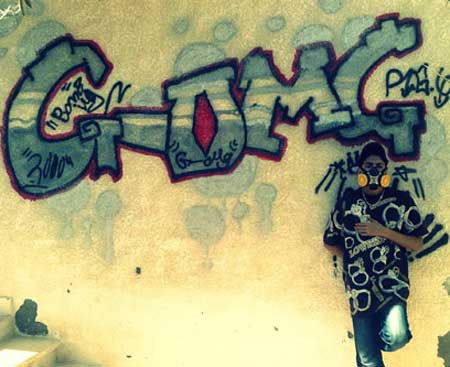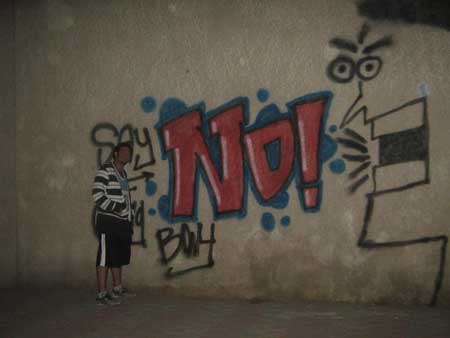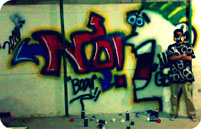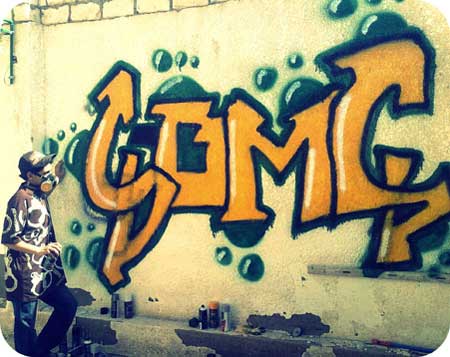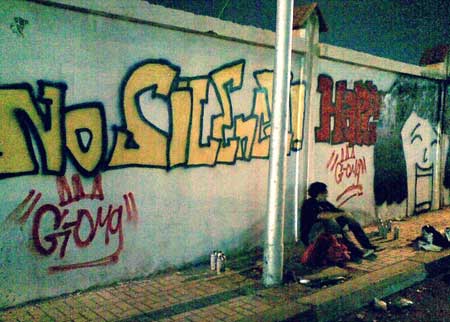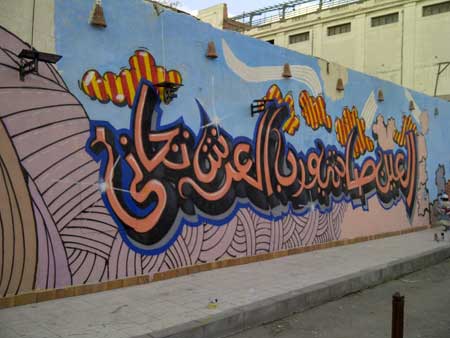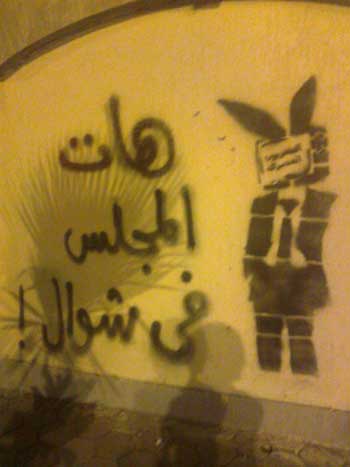Interview with Mahmoud Graffiti,
a graffiti writer in Alexandria, Egypt
John Lennon
University of South Florida
After interviewing The Freedom Painters, I became increasingly interested in graffiti writers in Egypt who are writing during a period of historic national transformations. I found Mahmoud Graffiti on Twitter and interviewed him. I have placed both the first interview and the follow-up interview below. You can follow Mahmoud on Twitter: @M_graffiti. The interviews happened between January and March, 2012 after the fall of Hosni Mubarak and during the interim rule of the Supreme Council of Armed Forces SCAF.
1st interview
JL: Please tell us about the first time you went out and wrote on a wall. How old were you? Why do you think you went out and did it?
MG: The first time I wrote on a wall I guess I was 16 and before that I used to make graffiti in my first graffiti sketch [book] so it was my name and I found it a good chance to gain experience with spray cans and how to use them.
JL: How long have you been writing? Who are your influences? How would you describe your style? How often do you go out to write?
MG: This is the fourth year that I have been writing. I was influenced by the great graffiti writers of New York, like Cope2 and Can2. I can't really describe my style because every piece has its own needs and style. Also, I do not go out and write at any specific times; whenever I feel the need to go out and paint, I just do it.
JL: Please tell us about the graffiti scene in Egypt. Is there a large scene? Are you part of a crew? What access to paint/markers do you have? How connected are you to other writers throughout the world?
MG: I am pretty sure there is a large graffiti scene in Egypt. And no, I am not a part of a crew, but I don't mind making graffiti with other artists. Although I do not have too many graffiti tools, like caps or markers, I have managed to support myself and evolve my style. I have connected with other writers through the internet and now I have good connections with writers from all over the world.
JL: You have been a writer both during Mubarak's reign as well as during the revolution. Please tell us what it was like to be a writer during both of these times. Take us through a night of writing during these periods—how have things changed?
MG: Being a writer during Mubarak's time didn't always get you in trouble—only if you were making political graffiti against the regime. So during that time I had to be careful while making any political pieces, because you could be in big trouble if you got arrested by the security forces. But during the revolution it was very easy for anyone to go out and write whatever and wherever they wanted to. Now, the SCAF (Supreme Council of the Armed Forces) is taking Egypt in the same direction Mubarak did, and many writers have been arrested since the SCAF came to power.
JL: What is the reaction to your work? Is it generational? What would happen if you were caught? Or, what did happen when you were caught?
MG: The reaction to my work isn't my first concern; it will be in a public place, and everyone who sees it will probably have a different reaction to it.
No, I have never been caught as a result of my graffiti. But if someone is caught, they could be held for hours before they are set free, or even have fake accusations leveled against them.
JL: What, in your view, is the point of graffiti? Do you think of it as art? Vandalism? Political? Fun? Resistance? All of the above? None of the above?
MG: Graffiti is an art, and art can include all of these things [vandalism, politics, fun, resistance] and many more.
JL: How is being a writer part of your identity? We would like to have some pertinent information about you—as much as you feel comfortable sharing: How old are you? How would you describe your politics? How would you describe your economic class? Are you religious? A little background on you—and again, how much you want to reveal is up to you—would help us get a fuller picture.
MG: Being a graffiti writer is a great way to express yourself and your art, and of course it is a part of your personality. I am 19 years old, and I can say that I am a leftist socialist and a middle-class Egyptian, not religious. My name is Mahmoud, I am Egyptian, and based in Alexandria. I am studying Oriental Languages (Hebrew, Persian, and Turkish) at Alexandria University, and I work as a translator.
Follow-up interview
JL: You stated that you started writing graffiti around 16 and you also seem to know of graffiti artists like Cope2 (you know he has a twitter account, right?) Could you tell me more about your early connection to graffiti? When did you first come in contact with it? How old were you? Did your first connection to graffiti come from writers in Alexandria/Egypt or did it come from the West?
MG: Actually no, I did not know that Cope2 had a twitter account.
My first contact with graffiti happened about three to four years ago (I was about 16). At that time, there weren't any "famous" writers in Alexandria, or even in Egypt. So my first connection to graffiti came from the west, by watching videos about the history of graffiti, tutorials on how to create graffiti, etc.
JL: You stated that every piece has its own "needs and style" and I completely get that. But when I look at the photos that you sent me, I see a certain connection to NYC graffiti. In fact, there is certainly a connection to "Wild Style" writing—with your own unique spin on it, of course. Would you agree with this assessment? Was Wild Style an influence? What are some of your other influences?
MG: I wouldn't completely agree with that assessment, but you can say I was influenced by NYC artists and NYC graffiti in general (which includes "Wild Style" along with many other styles and elements) and by other artists from all over the world. But NYC is the main source of influence.
JL: You state throughout your answers that you consider yourself an "artist"—and I certainly see that with your pieces. Just to clarify: would you consider yourself an artist who uses the form of graffiti, or would you consider yourself a graffiti writer who has an artistic style?
MG: I do not judge my art or my pieces; I let the viewers interpret the pieces in their own way, and judge the artist—who they will probably not know—however they choose to.
JL: In one of your responses you wrote that "graffiti is an art." I'm interested in your view here about this: Is all graffiti art? What about taggers? What about those who took up a spray can for the first time during the revolution to write a political message—is that art as well, in your opinion?
MG: I consider all graffiti as art. Graffiti shouldn't be the same everywhere. To me, even ancient cave painting is graffiti and art—it's about expressing yourself and your thoughts. And regarding those who took up a spray can and wrote a political message for the first time during the revolution—Graffiti is the strongest revolutionary art and the one that is the closest to the people. So of course they are artists; they expressed themselves in an artistic, revolutionary way.
JL: I have spoken to other graffiti artists in Cairo, who have stated that there was not a graffiti scene prior to 25th January, 2011. What would your response to this be?
MG: There was definitely a big graffiti scene in Cairo even before the revolution, but there wasn't that mass media focus on the artistic pieces. Moreover, if the graffiti had a political message, then the government would block it the very next day. That is why a lot of people think there wasn't a graffiti scene in Egypt before the revolution. But I can name artists I know who were making graffiti even before the revolution.
JL: As revolution spread throughout Egypt, a large number of people took to the streets to demand governmental change. Do you feel that graffiti had a role in this change? What role, in your opinion, does art play in the revolutionary process? As a side note to this question (and only answer if you feel comfortable doing so), did you participate in the demonstrations in Tahrir Square? Could you explain the reasons for doing so? And how did that experience affect your artworks, specifically?
MG: Of course graffiti had a big role in this change. Seeing all the graffiti pieces and stencils demanding change all over Egypt pushes people to think, and only can they demand change and demand their rights. So yes, art plays a major role in a revolution, as I have explained before.
Of course I participated in the demonstrations in Tahrir Square, although, I mostly demonstrated in Alexandria, since I live there. I did that because everything was wrong and that regime had to go down, but unfortunately it didn't. That gave me real ideas about the real conditions of Egypt's people, and of course, more art.
JL: You mentioned that you are in university. Do you see a connection between your writing and your university education?
MG: No, my university education and work are in one direction, and my art is in another direction. But actually I enjoy that; this gives me experiences across many fields, something that I am sure I will need in the future.
Images
